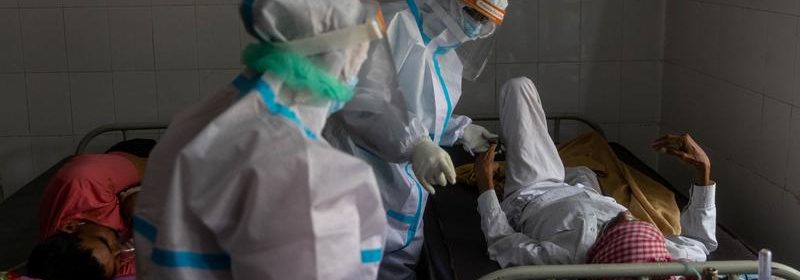India COVID-19 variant exhibits resistance; antibody drug shows promise

(Reuters) – The following is a roundup of some of the latest scientific studies on the novel coronavirus and efforts to find treatments and vaccines for COVID-19, the illness caused by the virus.
India variant shows resistance to antibody drugs, vaccines
Antibody drugs and COVID-19 vaccines are less effective against a coronavirus variant that was first detected in India, according to researchers. The variant, known as B.1.617.2, has mutations that make it more transmissible. It is now predominant in some parts of India and has spread to many other countries. A multicenter team of scientists in France studied a B.1.617.2 variant isolated from a traveler returning from India. Compared to the B.1.1.7 variant first identified in Britain, the India variant was more resistant to antibody drugs, although three currently approved drugs still remained effective against it, they found. Antibodies in blood from unvaccinated COVID-19 survivors and from people who received both doses of the Pfizer/BioNTech vaccine were 3-fold to 6-fold less potent against the India variant than against the UK variant and a variant first identified in South Africa, according to a report posted on Thursday on the website bioRxiv ahead of peer review. The two-dose AstraZeneca vaccine, which does not protect against the South Africa variant, is likely to be ineffective against the India variant as well. Antibodies from people who had received their first dose “barely inhibited” this India variant, said study co-author Olivier Schwartz of Institut Pasteur. The study, Schwartz added, shows that the rapid spread of the India variant is associated with its ability to “escape” the effect of neutralizing antibodies. (bit.ly/3fQLeJ0)
New antibody drug keeps mild COVID-19 from worsening
An antibody drug from Vir Biotechnology and GlaxoSmithKline that protects against progression of COVID-19 in high-risk patients with mild to moderate disease received emergency use authorization by the U.S. Food and Drug Administration on Wednesday. In a large randomized trial, patient risk of progression to more severe illness was reduced by 85% with the drug, sotrovimab, compared to a placebo, according to an interim report from the trial posted on Friday on the medRxiv website in advance of peer review. Everyone in the trial had risk factors for severe COVID-19 such as heart disease, diabetes, obesity and old age. Three of 291 patients (1%) in the sotrovimab group became sick enough to be hospitalized, versus 21 of 292 (7%) in the placebo group, researchers said. All five patients who needed to be admitted to intensive care received placebo, they reported. Serious complications were less common with sotrovimab than with placebo, they added. The antibody treatment will be available for COVID-19 patients in the coming weeks, GSK and Vir said on Wednesday. (bit.ly/3i4udO2; reut.rs/3wH9xjq)
Joint and muscle disease drugs may limit vaccine response
The COVID-19 vaccines from Pfizer/BioNTech and Moderna may be less effective in patients taking immunosuppressant drugs for rheumatic and musculoskeletal diseases, researchers said. “While additional research is required, patients on immunosuppressants should be aware that they may not be fully protected against COVID even after full vaccination. Therefore, patients should talk to their providers before relaxing precautions,” said Dr. Julie Paik of Johns Hopkins University School of Medicine in Baltimore. In an earlier study, her team found that most patients with rheumatic and musculoskeletal diseases do respond appropriately to the vaccines. Looking more closely at 20 people whose immune systems did not respond well – that is, no antibodies were detectable after vaccination – the researchers found that most were receiving multiple immunosuppressive agents. “A unifying factor” among the patients was their use of medications such as rituximab and mycophenolate mofetil that affect immune cells called lymphocytes that produce antibodies and help control immune responses, the researchers reported on Monday in the journal Annals of Internal Medicine. “Our study highlights the need for physicians and patients to be aware that immunosuppressants may prevent an appropriate vaccine response against SARS-CoV-2,” Paik said. (bit.ly/3fuX7oV)
Robust, coordinated immune response marks mild COVID-19
In COVID-19 patients who do not become seriously ill, the immune system reacts to the virus “robustly,” with a highly coordinated response, and this coordination may be one key to ensuring a mild illness, according to researchers. Detailed studies of immune system behavior in COVID-19 patients have focused primarily on those with moderate or severe illness and have found “uncoordinated” immune responses. The new study, posted Wednesday on the bioRxiv website ahead of peer review, “used cutting-edge methods to deeply study immune cells” in 18 patients with only mild illness, said study co-author Greg Szeto of the Allen Institute for Immunology in Seattle. In these mildly ill volunteers, the more intense the immune response in early infection, the higher the levels of antibodies in their blood after recovery, the multicenter research team found. And compared to participants who recovered, participants who had lingering troublesome symptoms – so-called Long Covid – had weaker immune responses to the virus in early infection, Szeto added. The differences the study found between mildly ill patients who did and did not develop Long Covid may help researchers devise more personalized ways to monitor immune responses to the virus and better methods for treatment, Szeto’s team concluded. (bit.ly/3ushEi5)
Open (here) in an external browser for a Reuters graphic on vaccines in development.
Source: Read Full Article
